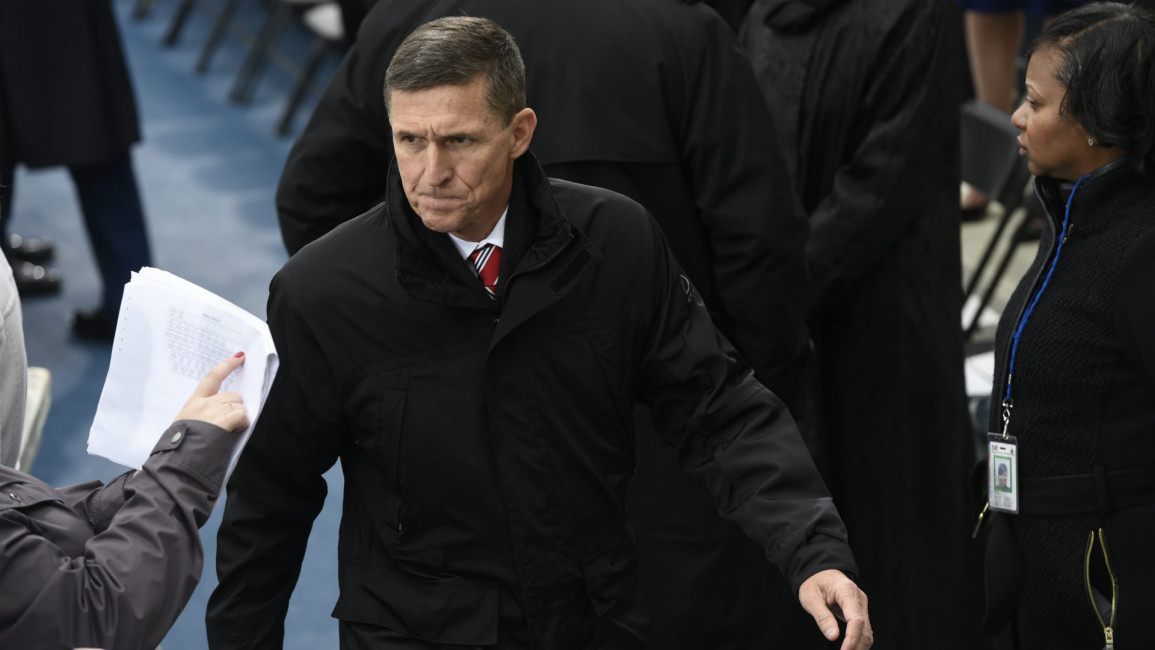
Flynn may have gone, but Russia's alt-right influence persists
Since the very beginning of Donald Trump's successful journey to become president, the spectre of Russia has accompanied him every step of the way. Sometimes it has carried him, such as with its unprecedented interference on his behalf during the election. At other times, such as now, it has threatened to hinder him, as a potential source of conflict with a Republican Party that has been traditionally antagonistic to Russian influence.
It is of no surprise then that Russia is at the heart of Trump's first major scandal as president, namely the resignation of his national security adviser Michael Flynn.
However, it's important not to overstate the so-called "Russian dynamic" when assessing the Trump phenomenon.
Other domestic factors, namely the growing nativism among certain strata of White America, as well as Trump's ability to attach this to the economic instability exacerbated by the financial crisis, have obviously played more vital roles in the rise of the 70-year-old billionaire.
Even the Republican Party's historic antagonism towards Russia was challenged by the George W Bush administration's support for the escalation of Russia's monstrous war in Chechnya, which was, at the time, spuriously sold as being part of the general "war on terror". More recently, Obama offered no real resistance to Russia as it began its brutal intervention in Syria.
But Hillary Clinton would have.
And this is the major motivation as to why Russia took unprecedented action to support Trump and subvert the US election process. Clinton understood that Russia's growing power relied solely on US appeasement of such power - she understood that Russia's aggression against Ukraine could be countered by the US materially supporting Ukrainian self-determination, while she supported the US materially aiding Syrian rebel forces in order to counter the support given to Assad by Russia.
She was even speaking of implementing "non-bombing zones" for the purposes of both protecting civilians and hastening the demise of Assad. One could indulge in huge debates as to why Clinton believed all this, but the point is that, unlike Trump who was gushing with praise about Putin and who had indicated that he supported Russia's intervention in Syria and their illegal annexation of Crimea, she was saying all the wrong things when it came to Russian interests.
 |
Flynn was also Trump's Islamophobe-in-chief, with him describing Islam - not 'radical Islam', as is the usual code among bigots - as 'a malignant cancer' |  |
Along with these pragmatic reasons for Russian support for Trump, there was also the wider ideological congruence between Putin and the kind of politics Trump represents.
Enter Michael Flynn.
As well as being his national security adviser, Flynn was also Trump's Islamophobe-in-chief, with him describing Islam - not "radical Islam", as is the usual code among bigots - as "a malignant cancer" and advising that fear of Islam was rational and ought to be encouraged.
He further stated that Islam was a "political ideology" that "hides behind this notion of it being a religion".
In other words, Muslims are - whether they like it or not, and no matter how hard they try to convince you that they're just normal people - foot soldiers of a cancerous ideology that threatens to eat up the Christian way of life.
Given Flynn was one of Trump's most trusted advisers, it's not difficult to understand the kinds of fascistic gutter narratives that shaped the Trump regime's Muslim ban, but it's also not difficult to understand why Flynn might be something of a Putinophile.
In 2015, Flynn attended a gala in Moscow held in honour of Putin's main propaganda outlet, RT. He defended his close ties with the Russian state by referencing US support for the USSR during teh Second World War (with Nazism, in Flynn's mind, being Islam, I assume), and saying that the US and Russia had "mutual interests" - in that they both had "a problem with radical Islam", which they could "work together against".
Flynn has also regurgitated key Russian propaganda points regarding Syria, such as by refusing to rule out the absurd idea that it was the Syrian rebels and not Assad who carried out the 2013 Ghouta sarin gas attacks.
 |
Putin's ultra-paternalistic, illiberal and authoritarian state is a model that the western far-right seeks to emulate |  |
Much like the Russian Orthodox Church, Flynn believes that Putin is defending Christian civilisation against Islam.
Variants of this narrative are long-held by the far-right in the West - that Russia is the last bastion of traditional Christian, "western" or even "white" civilisation, sandwiched between, on the one hand, the external enemy of Islam and, on the other hand, the internal enemy of liberalism, cosmopolitanism and egalitarianism.
Putin's ultra-paternalistic, illiberal and authoritarian state is a model that the western far-right seeks to emulate and adulate - when Putin then began to intervene on behalf of Assad's tyranny, using the Islamic State group as a pretext for viciously attacking anti-Assad and anti-IS Syrian rebels and civilians who live in liberated parts of Syria, it was like a dream come true for these forces.
And Putin has exploited this, forging ties and even funding far-right groups that want to - in a classic divide and rule strategy - break up the European Union in favour of illiberal, authoritarian far-right nativism, all of which is in the interests of Russia.
The rise of Trump as president seems to be partly a fruition of this Russian strategy - and key to this was Michael Flynn. In one of his first acts as the national security adviser to President Trump, Flynn met in Trump Tower with Heinz-Christian Strache, leader of the far-right, ultra-Islamophobic Austrian Freedom Party, whose candidate came a close second in the recent presidential election, and which had also just signed a "cooperation agreement" with Putin's ruling United Russia party.
 |
While it might seem as if Flynn's resignation has been a blow to all this, one must realise that Flynn was only forced to resign because he was caught lying in public |  |
Strache clearly seemed to believe that the two events were related, saying of both his meeting with Flynn and his pact with Putin that "internationally, the Freedom Party continues to gain influence".
This is one of the most sinister aspects of recent events - the cultivation of what has become a white supremacist "alt-right" international, led by Russia - and now with the tentative support of Trump's America.
This is certainly how Trump's chief strategist and second in command Steve Bannon sees it, praising fascist and anti-immigrant parties like France's Front National and the United Kingdom Independence Party, and describing the formation of what he called "a global Tea Party movement".
While it might seem as if Flynn's resignation has been a blow to all this, and the Russian political class has been up in arms about it, one must realise that Flynn was only forced to resign because he was caught lying in public. His offence was lying about having discussed Trump rescinding Obama's sanctions on Russia with the Russian ambassador immediately before Trump took office as president, including lying to the vice-president and other White House officials about it.
But there's no indication that the politics underlying Flynn's manoeuvrings are somehow anathema to Trump himself - far from it.
There is speculation that Trump knew about Flynn's talks with the Russian ambassador and he has already begun to ease sanctions on Russia's intelligence agencies, while he continues to cultivate ties with Putin's far-right European allies.
Flynn's resignation does further prove that Trump's regime is fundamentally chaotic. In addition to the split within Trump's cabinet - between those who feel Russia is a threat, such as Vice-president Mike Pence and Secretary of State James Mattis, and the so-called "alt-right" who view Putin's Russia as an ideological ally - there are the constant intra-departmental leaks, Trump's plummeting approval ratings and the blocking of his Muslim ban by the courts.
Not to mention widespread protests against his fascistic politics and the constant threat of further revelations about how the man who vowed to "Make America Great Again" has so sordidly sold himself to Russia.
Trump might act like a dictator and show disdain for democratic accountability and any criticism, but the forced resignation of Flynn is an early victory for those who believe that this would-be petty tyrant ought to be fought at every turn.
Sam Hamad is an independent Scottish-Egyptian activist and writer.
Opinions expressed in this article remain those of the author and do not necessarily represent those of The New Arab, its editorial board or staff.




